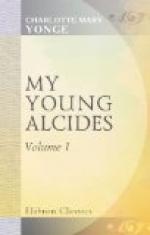Harold had never touched liquor since the day of his child’s death, nor spoken of it; but when his dying uncle begged him to watch over his young cousins, he took up the Bible that lay on the bed, and, unsolicited, took a solemn oath to taste nothing of the kind for the rest of his life.
Afterwards the three had lived on together at Boola Boola. Then had come the tidings of the inheritance supposed to be Harold’s, and with the relief of one glad to make a new beginning, to have a work to do, and leave old things behind, he had taken both the others with him.
So it was true! My noble-looking Harold had those dark lines in his spectrum. Wild ungovernable strength had whirled him in mere boyhood at the beck of his passions, and when most men are entering freshly upon life, he was already saddened and sobered by sin and suffering. The stories whispered of him were more than true. I remember I cried over them as I sat alone that evening. Eustace had not told all with the extenuations that I discovered gradually, some even then by cross-questioning, and much by the tuition of that sisterly affection that had gone out from me to Harold, and fastened on him as the one who, to me, represented family ties.
I never thought of breaking with him. No, if I had been told he might be insane that very night, it would have bound me to him the more. And when I went to bid him “Good-night” and take away Dora, and saw the massive features in their stillness light up into a good-natured smile of thanks at my inquiries, I could believe it all the less. He was lying cornerwise across the bed, with a stool beyond for his feet to rest on, and laughed a little as he said he always had to contrive thus, he never found a bed long enough; and our merriment over this seemed to render what Eustace had told me even more incongruous in one so scrupulously gentle.
That gentleness was perhaps reactionary in one who had had such lessons in keeping back his strength. He had evidently come forth a changed man. But that vow of his—was it the binding of a worse lion than that he had fought with to-day? Yet could such things be done in the might of a merely human will? And what token was there of the higher aid being invoked? My poor Harold! I could only pray for him! Alas! did he pray for himself?
I was waked in early morning by Dora’s vociferous despair at the disappearance of her big patient, and then Eustace’s peremptory fretful tone was heard silencing her by explaining that Harold’s hurts had become so painful that he had walked off to Mycening to have the bandages loosened.
Indeed, when we met at breakfast, Eustace seemed to think himself injured by the interruption of his slumbers by Harold’s coming to him for assistance in putting on his clothes, and stared at my dismay at his having permitted such an exertion. Before long, however, we saw an unmistakable doctor’s gig approaching, and from it emerged Harold and Mr. Yolland. I saw now that he was a sturdy, hard-working-looking young man of seven or eight and twenty, with sandy hair, and an honest, open, weather-beaten face. He had a rather abrupt manner, but much more gentleman-like than that of the usual style of young Union doctors, who are divided between fine words and affectation and Sawbones roughness.




